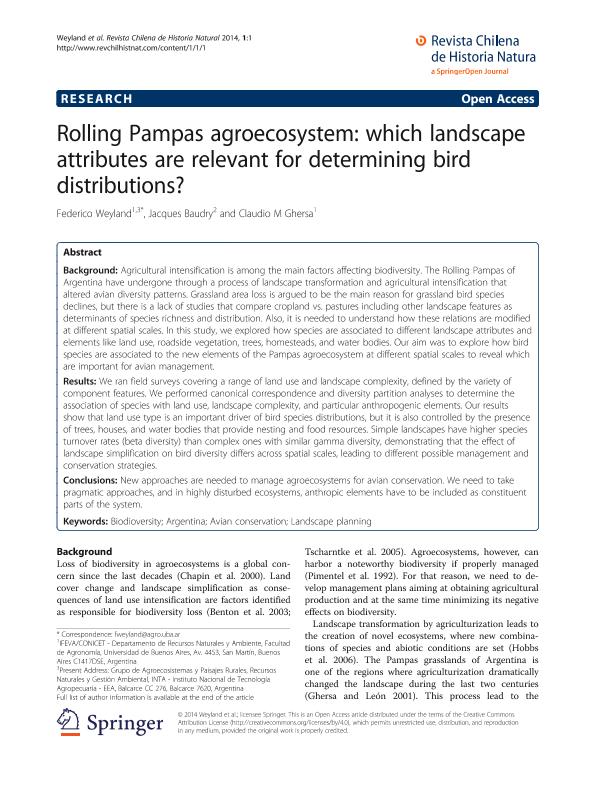Mostrar el registro sencillo del ítem
dc.contributor.author
Weyland, Federico

dc.contributor.author
Baudry, Jacques
dc.contributor.author
Ghersa, Claudio Marco

dc.date.available
2016-02-17T20:45:45Z
dc.date.issued
2014-04
dc.identifier.citation
Weyland, Federico; Baudry, Jacques; Ghersa, Claudio Marco; Rolling Pampas agroecosystem: which landscape attributes are relevant for determining bird distributions; Sociedad de Biología de Chile; Revista Chilena de Historia Natural; 87; 1; 4-2014; 1-12
dc.identifier.issn
0716-078X
dc.identifier.uri
http://hdl.handle.net/11336/4236
dc.description.abstract
Background: Agricultural intensification is among the main factors affecting biodiversity. The Rolling Pampas of Argentina have undergone through a process of landscape transformation and agricultural intensification that altered avian diversity patterns. Grassland area loss is argued to be the main reason for grassland bird species declines, but there is a lack of studies that compare cropland vs. pastures including other landscape features as determinants of species richness and distribution. Also, it is needed to understand how these relations are modified at different spatial scales. In this study, we explored how species are associated to different landscape attributes and elements like land use, roadside vegetation, trees, homesteads, and water bodies. Our aim was to explore how bird species are associated to the new elements of the Pampas agroecosystem at different spatial scales to reveal which are important for avian management. Results: We ran field surveys covering a range of land use and landscape complexity, defined by the variety of component features. We performed canonical correspondence and diversity partition analyses to determine the association of species with land use, landscape complexity, and particular anthropogenic elements. Our results show that land use type is an important driver of bird species distributions, but it is also controlled by the presence of trees, houses, and water bodies that provide nesting and food resources. Simple landscapes have higher species turnover rates (beta diversity) than complex ones with similar gamma diversity, demonstrating that the effect of landscape simplification on bird diversity differs across spatial scales, leading to different possible management and conservation strategies. Conclusions: New approaches are needed to manage agroecosystems for avian conservation. We need to take pragmatic approaches, and in highly disturbed ecosystems, anthropic elements have to be included as constituent parts of the system.
dc.format
application/pdf
dc.language.iso
eng
dc.publisher
Sociedad de Biología de Chile

dc.rights
info:eu-repo/semantics/openAccess
dc.rights.uri
https://creativecommons.org/licenses/by/2.5/ar/
dc.subject
Biodiversity
dc.subject
Argentina
dc.subject
Avian Conservation
dc.subject
Landscape Planning
dc.subject.classification
Agricultura

dc.subject.classification
Agricultura, Silvicultura y Pesca

dc.subject.classification
CIENCIAS AGRÍCOLAS

dc.title
Rolling Pampas agroecosystem: which landscape attributes are relevant for determining bird distributions
dc.type
info:eu-repo/semantics/article
dc.type
info:ar-repo/semantics/artículo
dc.type
info:eu-repo/semantics/publishedVersion
dc.date.updated
2016-03-30 10:35:44.97925-03
dc.identifier.eissn
0717-6317
dc.journal.volume
87
dc.journal.number
1
dc.journal.pagination
1-12
dc.journal.pais
Chile

dc.journal.ciudad
Santiago de Chile
dc.description.fil
Fil: Weyland, Federico. Consejo Nacional de Investigaciones Científicas y Técnicas. Oficina de Coordinación Administrativa Parque Centenario. Instituto de Investigaciones Fisiológicas y Ecológicas Vinculadas a la Agricultura; Argentina
dc.description.fil
Fil: Baudry, Jacques. INRA - SAD; Francia
dc.description.fil
Fil: Ghersa, Claudio Marco. Consejo Nacional de Investigaciones Científicas y Técnicas. Oficina de Coordinación Administrativa Parque Centenario. Instituto de Investigaciones Fisiológicas y Ecológicas Vinculadas a la Agricultura; Argentina
dc.journal.title
Revista Chilena de Historia Natural

dc.relation.alternativeid
info:eu-repo/semantics/altIdentifier/issn/0716-078X
dc.relation.alternativeid
info:eu-repo/semantics/altIdentifier/url/http://ref.scielo.org/3x4mjh
dc.relation.alternativeid
info:eu-repo/semantics/altIdentifier/url/http://revchilhistnat.biomedcentral.com/articles/10.1186/0717-6317-87-1
dc.relation.alternativeid
info:eu-repo/semantics/altIdentifier/url/http://link.springer.com/article/10.1186%2F0717-6317-87-1
dc.relation.alternativeid
info:eu-repo/semantics/altIdentifier/doi/http://dx.doi.org/10.1186/0717-6317-87-1
Archivos asociados
